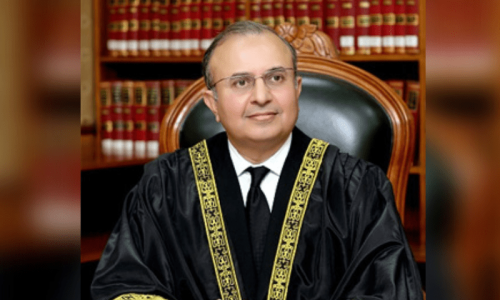EVERYONE knows that Pakistan is facing a national security crisis. But what no one understands is why the leadership is either missing in action or flailing around.
Instead of unity of command, thought and policy that national crises generally produce, a worried nation has so far only watched a dispiriting display of inane politics and point-scoring among civil and military institutions.
The dithering and delay in responding to the US 'operation kill-OBL' is shocking and should be cause for senior heads to roll. However, much more worrying is how in this crunch time the decision-making process has become dysfunctional by its inner contradictions.
For a couple of days after the May 2 events, Pakistan looked like 796,095 square kilometres of ungoverned space, whose leaders had gone on leave — quite literally in the case of Prime Minister Yousuf Raza Gilani, who, along with Minister of State for Foreign Affairs Hina Rabbani Khar and others, regaled himself with a visit to France. The president of Pakistan has gone into his shell — a technique he has developed to deal with all matters of supreme national importance, which do not affect his personal, financial or political standing.
The remains of the decision-makers in Pakistan, the army top brass and the Foreign Office bureaucracy have been centring their energies on formulating a narrative that could describe Pakistan's take on the death of Osama and the US invasion of our land.
It is sad to see that even with all kinds of briefings, and many press releases, the message has not got through that the country is in capable hands. The accounts given even after much deliberation and effort have not been able to clear the domestic air of suspicion and doubt.
This is hardly surprising. In national emergencies, coherence of action, and not printed and spoken words, set the course for national debate. And this coherence of action comes from institutionalised decision-making. Both these elements are completely missing from the picture of decision-making that has emerged in the past one week.
The civilian leadership has passed the buck of responsibility to the army and the ISI. This looks like sweet revenge on these institutions' forays into politics and their domination of the national power scene.
However, by keeping quiet and deciding to stay in the background, the president, the prime minister and parliament have created a frightening situation. They have left serious matters of war and defence purely to the generals.
In certain political circles, there is unmistakable jubilation at the “humbling of the Pakistan Army”. Others are casting doubts on the official stance that no one knew about Osama bin Laden's presence in Abbottabad.
A close aide of President Zardari cited on Twitter former Afghan intelligence chief Amrullah Saleh saying that they had informed Pakistan four years back about the presence of Osama in Abbottabad. She also cited the same source as claiming that Mullah Omar was present in Karachi, and that the Afghans daily brief DG ISI Gen Pasha on Taliban leaders.
This was the day after the Pakistan Army and the Foreign Office had gone to great lengths to deny this insinuation. But this clearly had no impact on the tweeting aide. She preferred to forward Afghanistan intelligence propaganda instead. This points to the civilian leadership's deep distrust of the military high command. Consequently, there is no political ownership of the national policy response that Pakistan has articulated in the wake of Osama's killing. While this might serve some limited political interests it comes at the cost of further weakening civilian oversight of national security.
Civilian disinterest in national security matters is also reflected in the poor response from the elaborate institutional framework involving the defence ministry, parliamentary committees and subcommittees related to defence, defence production and national security. They are nowhere on the policy horizon and look like showpiece arrangements.
The opposition's conduct is just as disappointing. The PML-N took long to articulate its response. And when the response finally came, it fell short of the requirement of the situation: it was plain criticism and no concrete plan of action.
It seems that nobody wants to tackle the hard part of the job, suggesting policy alternatives and options. The opposition like the government appears pleased that the generals are getting punched around.
Feeling let down and completely exposed to public ire, the military leadership has developed a deep grievance. Some of this frustration came out at a background briefing to journalists last week at GHQ. Lt Gen Shuja Pasha almost choked with anger while complaining that the ISI was facing not just outside challenges but constant criticism from inside.
The chief of army staff Gen Kayani too was visibly irritated when he said that the civilian government had abandoned the ship of policymaking. (It was quite ironic to see some of the most vocal proponents of parliament's supremacy in security matters from among the group of journalists goad and plead to the generals to take the lead in policymaking.)
Altogether this makes a sad national scene. If the blame game does not stop, distrust will completely paralyse decision-making. This will make the job of Pakistan's adversaries a lot easier.
The civilian government has an opportunity to assert its authority and take charge of the security sector as never before. If it wants it can fix responsibility and axe whoever is found wanting in efficiency. But to do that, the government first has to appreciate the gravity of the situation and genuinely believe that US actions have punched a gaping hole in national security. Seeking narrow political mileage out of a national crisis is a high-risk game. The government might win but the country will surely lose.
The writer is a senior journalist at DawnNews.










































Dear visitor, the comments section is undergoing an overhaul and will return soon.